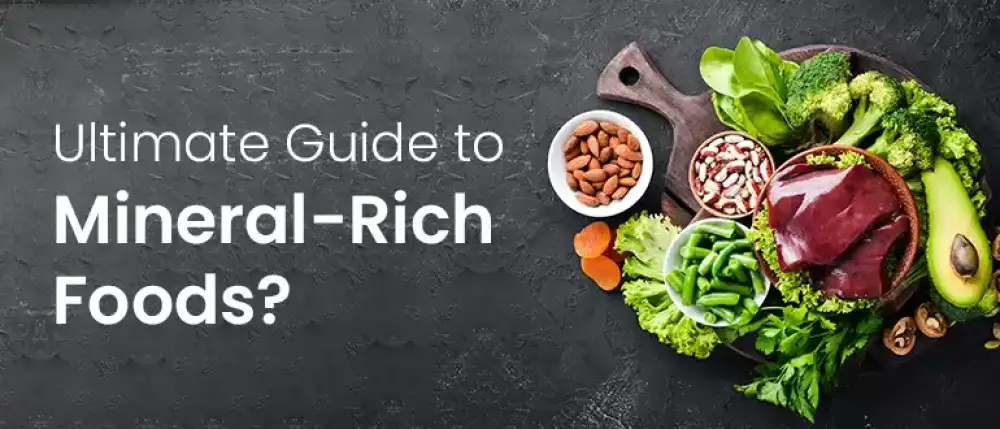Subscribe to get weekly insights
Always stay up to date with our newest articles sent direct to your inbox
Published on 16 Aug, 2024
Updated on 2 Nov, 2025
2549 Views
3 min Read

Written by Mudit Handa
favorite1Like
A healthy diet is crucial to maintaining a sound mind and body. It is important for the body’s immunity and protects you against malnutrition and other diseases. A healthy and nutritious diet consists of several components, like protein, fibre, carbohydrates, vitamins, minerals, and much more.
Each of these components has a specific role to play. However,minerals play a vital role in maintaining your overall growth and body functioning. They are inorganic substances that help your body build strong bones and muscles. Thus, it is crucial to include mineral-rich foods to ensure a nutritious diet. A few examples of minerals are zinc, sodium, potassium, iron, magnesium, and manganese. Additionally, you can easily find these minerals in various fruits and vegetables like avocados, berries, beans, broccoli, cauliflower, asparagus, brussels sprouts, carrots, corn, cucumber, etc.
Types of Minerals Minerals are important components that ensure your food transforms into energy. Based on your body's needs, minerals are divided into macro-minerals and micro-minerals:
Including minerals in your food is the best way to keep yourself healthy and enhance your life expectancy. Here is a list of a few sources of mineral-rich foods:
Nuts and seeds are enriched with mineral content. They are packed with various mineral sources like copper, manganese, magnesium, and more. Additionally, these can be consumed in several ways. You can consume them in whole form or make delicious smoothies or shakes.
Cruciferous vegetables like broccoli, cauliflower, etc are great examples of mineral-rich vegetables. Their sulphur content is high, making them useful in body detoxification, DNA production, and various other body functions. These vegetables also help reduce the chances of chronic illness.
Eggs are superfoods, rich in both vitamins and minerals. You can get various essential nutrients, from iron to zinc to selenium, all in one.
Cocoa is your all-in-one health boost in a delicious disguise! It is packed with magnesium and copper. Magnesium is vital in producing energy, controlling and regulating blood pressure, and regulating sugar. Additionally, copper is important for metabolism, the formation of red blood cells, and several other body processes.
Beans are rich in a variety of vitamins and minerals. Be it fibre, protein, or minerals like copper, zinc, or phosphorus, you get everything from beans.
Tropical fruits like bananas, mangoes, and guava are rich sources of fibre and antioxidants and also contain minerals like potassium and magnesium. You can turn them into smoothies for a delicious way to boost your daily mineral intake!
Whether it's about health or minerals, green veggies are nutritional powerhouses you can't afford to ignore. Vegetables like spinach, lettuce, and other greens contain calcium, copper, magnesium, and more minerals. Additionally, these vegetables help reduce several diseases, such as cancer, diabetes, and heart-related illnesses.
Yoghurt is a rich source of calcium, responsible for keeping your bones and teeth healthy and strong.
Consuming mineral-rich foods is important to maintain a healthy body. A mineral-deficient diet can lead to several mineral deficiencies and related diseases. Here is a list of a few mineral deficiencies and their symptoms:
Also Read: 6 Sources of Iron to Include in Your Diet
Mineral-rich foods are an important component of a nutritional diet. They keep you energetic and healthy. Moreover, they also help you avoid the chances of several diseases. Yet, it is often seen that individuals lack minerals in their dietary regime. Therefore, you must keep an eye on your mineral intake and include mineral food sources in your diet to maintain your overall well-being.
It is also advisable to ensure your optimum health with health insurance. We at Care Health Insurance offer comprehensive coverage for you and your family. So that you get the best treatment whenever needed without worrying much about the expenses.
Disclaimer: The above information is for reference purposes only. Kindly consult your general physician for verified medical advice. The health insurance benefits are subject to policy terms and conditions. Refer to your policy documents for more information.
Thyroid : मामूली नहीं हैं महिलाओं में थायराइड होना, जानें इसके लक्षण और घरेलू उपचार Vipul Tiwary in Diseases
शुगर कंट्रोल कैसे करे? जानें, डायबिटीज में क्या खाना चाहिए Vipul Tiwary in Health & Wellness
हाई ब्लड प्रेशर को तुरंत कंट्रोल कैसे करें? देखें इसके उपाय Vipul Tiwary in Diseases
पैरों में दर्द किस कमी से होता है? जानें, इसके घरेलू इलाज Vipul Tiwary in Health Insurance Articles
Minerals in Water: Hard Water vs Soft Water Mudit Handa in Health & Wellness
Check Out This Miracle Mineral for Stress Relief and Sleep Mudit Handa in Diet & Nutrition
Always stay up to date with our newest articles sent direct to your inbox
Loading...